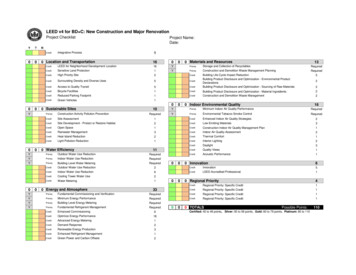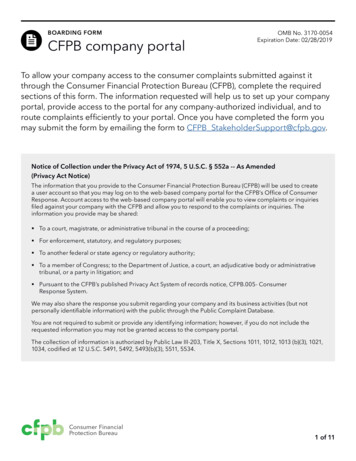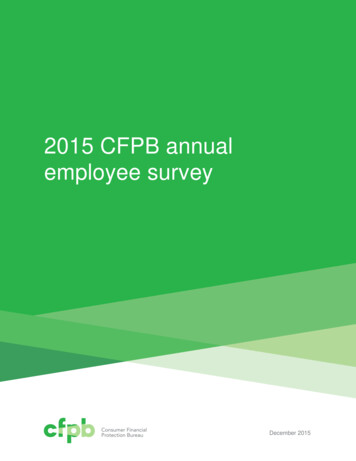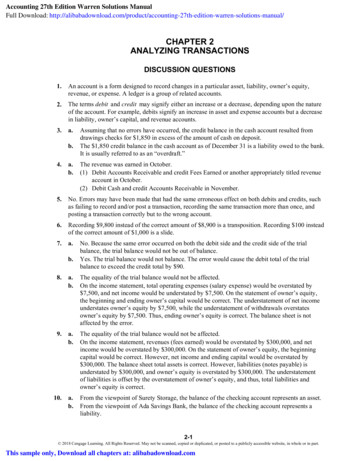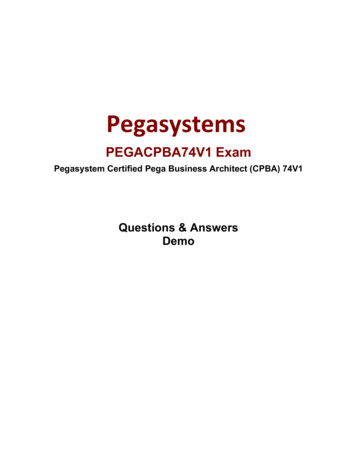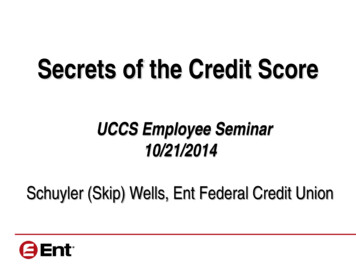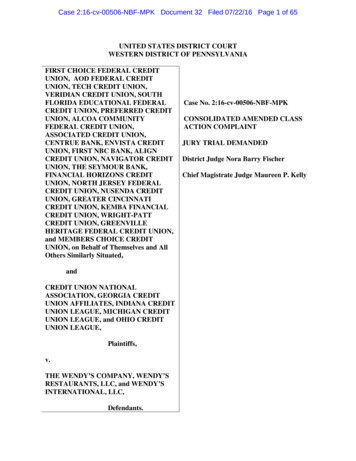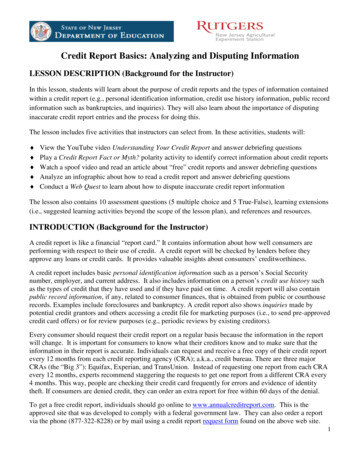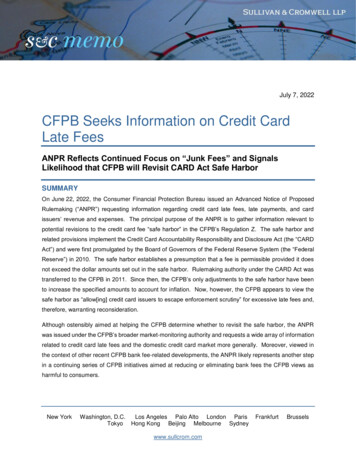
Transcription
July 7, 2022CFPB Seeks Information on Credit CardLate FeesANPR Reflects Continued Focus on “Junk Fees” and SignalsLikelihood that CFPB will Revisit CARD Act Safe HarborSUMMARYOn June 22, 2022, the Consumer Financial Protection Bureau issued an Advanced Notice of ProposedRulemaking (“ANPR”) requesting information regarding credit card late fees, late payments, and cardissuers’ revenue and expenses. The principal purpose of the ANPR is to gather information relevant topotential revisions to the credit card fee “safe harbor” in the CFPB’s Regulation Z. The safe harbor andrelated provisions implement the Credit Card Accountability Responsibility and Disclosure Act (the “CARDAct”) and were first promulgated by the Board of Governors of the Federal Reserve System (the “FederalReserve”) in 2010. The safe harbor establishes a presumption that a fee is permissible provided it doesnot exceed the dollar amounts set out in the safe harbor. Rulemaking authority under the CARD Act wastransferred to the CFPB in 2011. Since then, the CFPB’s only adjustments to the safe harbor have beento increase the specified amounts to account for inflation. Now, however, the CFPB appears to view thesafe harbor as “allow[ing] credit card issuers to escape enforcement scrutiny” for excessive late fees and,therefore, warranting reconsideration.Although ostensibly aimed at helping the CFPB determine whether to revisit the safe harbor, the ANPRwas issued under the CFPB’s broader market-monitoring authority and requests a wide array of informationrelated to credit card late fees and the domestic credit card market more generally. Moreover, viewed inthe context of other recent CFPB bank fee-related developments, the ANPR likely represents another stepin a continuing series of CFPB initiatives aimed at reducing or eliminating bank fees the CFPB views asharmful to consumers.New YorkWashington, D.C.Los Angeles Palo Alto London ParisTokyo Hong Kong Beijing Melbourne Sydneywww.sullcrom.comFrankfurtBrussels
BACKGROUNDA. INCREASED CFPB FOCUS ON “JUNK FEES”In recent months, the CFPB has criticized what it terms “junk fees”—fees the CFPB considers harmful toconsumers because they are not subject to competitive processes that ensure fair pricing. In December2021, for example, the CFPB released a report examining the practices of depository institutions with regardto overdraft and non-sufficient funds (“NSF”) fees.1 After finding that “overdraft and NSF fees made upclose to two-thirds of reported fee revenue,” CFPB Director Rohit Chopra criticized banks for becoming“hooked on overdraft fees to feed their profit model” instead of competing on price and service. DirectorChopra directed CFPB bank examiners to enhance their supervisory and enforcement scrutiny of banksthat are heavily dependent on overdraft fees.2 The following month, the CFPB issued a request forinformation (“RFI”) on how junk fees, which the CFPB said may include credit card late fees and depositaccount overdraft fees and NSF fees, “have impacted peoples’ lives.” 3 Director Chopra described the RFIas marking the start of “a new effort to help save American families billions of dollars in junk fees,” with thecollected information being used to identify financial institutions dependent on such fees and to issue newrules and guidance with a view toward “ending banks’ reliance on these exploitative income streams.” 4Since December 2021, numerous banks of varying sizes have announced they are reducing and sometimeseven eliminating overdraft or NSF fees. In a February 2022 CFPB blog post, the CFPB observed a recent“uptick in changes banks are making to their overdraft programs” and summarized overdraft and NSF datafor the 20 banks reporting the most in overdraft and NSF revenue. 5 According to the summary, as of late2021, all but one of the 20 banks charged overdraft or NSF fees. In a blog post two months later, the CFPBidentified by name the 25 banks reporting the most overdraft and NSF revenue and specified whether eachbank charges NSF fees or recently announced eliminating them.6 By that time, at least 13 of the 25 namedbanks had either ceased charging such fees altogether, recently announced plans to eliminate them, orannounced reductions in fee charges. Since the April post, at least three additional named banks haveannounced plans to eliminate or reduce these fees. 7In March 2022, in the midst of these developments related to overdraft and NSF fees, the CFPB issued areport analyzing credit card late fees. In the report, which foreshadowed the ANPR, the CFPB concludedthat (1) many major card issuers charge the maximum amount allowed under the safe harbor, (2) late feesaccount for over 10 percent of total fees and interest collected annually industry wide ( 12 billion in 2020alone), and (3) low-income areas, areas with high shares of Black Americans, and areas with lowereconomic mobility bear more of the late fee burden.8-2CFPB Seeks Information on Credit Card Late FeesJuly 7, 2022
B. THE CARD ACT AND THE SAFE HARBORThe 2009 CARD Act limited the fees and interest rate increases credit card issuers are permitted to charge.As particularly relevant here, the CARD Act requires penalty fees charged by issuers, including late fees,to be “reasonable and proportional” to the omission for which the fee is charged. 9As originally enacted, the CARD Act assigned rulemaking authority to the Federal Reserve, including astatutory directive to “provide an amount for any penalty fee or charge that is presumed to be reasonableand proportional.”10 This safe harbor, as originally implemented, reflected the amounts the Federal Reservedetermined to be presumptively reasonable.11 The Federal Reserve set these amounts at 25 for the firstlate payment and 35 for additional late payments during the next six billing cycles, in each case to beadjusted annually for inflation.12 An issuer choosing not to rely on the safe harbor (such as by imposinghigher fees) may impose a fee only after performing a “cost analysis” and determining that the dollar amountof the fee represented a reasonable proportion of the total costs incurred by the card issuer as a result ofthe omission.13In 2011, rulemaking authority under the CARD Act was transferred to the CFPB. The CFPB promptlyreissued the Federal Reserve’s implementing rule, including the safe harbor and cost analysis provisions,substantially unchanged. Presently, the inflation-adjusted amounts are 30 for the first late payment and 41 for each additional late payment during the next six billing cycles. 14THE CFPB ANPRThe CFPB requests information on a wide variety of topics relating to late fees and the domestic credit cardmarket more generally. The ANPR includes 38 numbered items (most with multiple sub-items), which theCFPB assigns to 11 categories. Where a time period is specified, the CFPB generally seeks informationfor 2019, 2020, and 2021. The 11 categories are outlined below.1.Factors used by card issuers to set existing levels of late fees. These items focus onhow card issuers determine late fee amounts, including the factors card issuers take intoaccount.2.Costs and losses. These items generally focus on the costs to issuers associated with latepayments, including types and amounts. Other items also address methods of cardholdercontact regarding late payments and data regarding late fee volumes.3.Deterrence. These items focus on the deterrent effect of late fees and other consequencesimposed on cardholders for late payments, and whether other methods are used to deter suchpayments. The CFPB suggests that autopay and due date notifications, each addressedbelow, may be other methods used by card issuers to deter late payments.4.Cardholder behavior. These items focus on the categories issuers use to classifycardholders based on their late payment behavior. The CFPB requests data on the share ofcardholders in these categories and when late-paying cardholders make at least the minimumpayment. The CFPB asks if there is other cardholder conduct the CFPB should consider inevaluating potential changes to the safe harbor.-3-CFPB Seeks Information on Credit Card Late FeesJuly 7, 2022
5.Autopay. These items address autopay offerings by issuers and related processes, includingthe rates of cardholder enrollment, incentives for enrolling, concerns with consumer use ofautopay, and benefits of autopay.6.Notifications of upcoming due date. These items address the methods used by cardissuers to contact cardholders about an upcoming due date, including any opt-in requirement,and whether the frequency or method of communication changes after the cardholder ischarged a late fee.7.Courtesy periods and fee waivers. These items focus on whether card issuers offercourtesy periods before assessing late fees, the length of or restrictions placed on suchperiods, and the circumstances in which issuers waive late fees.8.Staggered late fee. These items address whether issuers offer staggered late fees—forexample, 2 imposed no more often than every five days—and how such fees are structuredand determined.9.Safe harbor provisions. These items request information about factors the CFPB shouldconsider in evaluating changes to the safe harbor, late fee assessments that deviate from thesafe harbor amount, the safe harbor amount that would allow issuers to recoup their costs incollecting late payments, whether costs are higher with repeat late payments, changes to thesafe harbor provisions that may discourage use, and, where an issuer does not use the safeharbor, whether the CFPB should consider methods other than the cost analysis currentlyspecified in Regulation Z to determine the allowable late fee.10. Cost analysis provisions. These items request information regarding the cost analysisprovisions in Regulation Z, including amounts charged by issuers who actually use the costanalysis method or amounts that would be charged if they were to use that method, whetheradditional detail from the CFPB is needed on how to comply with the cost analysis, andwhether the CFPB should adopt additional processes and procedures should the CFPBrequire issuers to comply with the cost analysis provisions.11. Revenue and Expenses. These items request revenue associated with domestic consumercredit card operations, revenue from late fees, expense figures, and losses.Comments on the ANPR are due by July 22, 2022.15IMPLICATIONSThe ANPR may portend not only future proposed revisions to the safe harbor, but also additional areas ofCFPB interest and examination scrutiny relating to the domestic credit card market and late fees inparticular. More immediately, the ANPR and March 2022 report on credit card late fees, particularly whenviewed in light of the CFPB’s actions since late last year relating to bank overdraft fees and NSF fees,suggest that the CFPB may seek to exert pressure on credit card issuers outside of the ANPR process toreduce late fees below the amounts specified in the safe harbors—or even eliminate them entirely. Indeed,in his remarks accompanying the ANPR’s issuance, Director Chopra clearly articulated his concerns aboutthe potentially duplicative nature of credit card late fees.16Card issuers are not required to respond to the ANPR; comments and the submission of detailedinformation are entirely voluntary. However, if the CFPB does not secure the information it is seeking-4CFPB Seeks Information on Credit Card Late FeesJuly 7, 2022
through the ANPR, it could turn to the non-voluntary tools at its disposal to gather data to support theanticipated rulemaking proposal. Accordingly, if a card issuer has views on any of the matters with respectto which the CFPB requests comment, this may be the best opportunity to voice those views. Regardless,in light of the ANPR and the CFPB’s other bank fee-related actions, credit card issuers should closelyscrutinize their late fee-related practices and ensure they are able to coherently articulate the rationales forthese practices.Finally, issuers that rely on the safe harbor may wish to consider whether their current late fee scheduleswould be permissible as “reasonable and proportional” if the CFPB later revokes the safe harbor or reducesthe safe harbor amounts substantially below what the card issuer currently charges.**Copyright Sullivan & Cromwell LLP 2022-5CFPB Seeks Information on Credit Card Late FeesJuly 7, 2022*
ENDNOTES1CFPB Research Shows Banks’ Deep Dependence on Overdraft Fees (Dec. 1, 2021), available draft-fees/.2Id.3CFPB, Request for Information Regarding Fees Imposed by Providers of Consumer FinancialProducts or Services (Jan. 26, 2022), available at https://files.consumerfinance.gov/f/documents/cfpb oducts-services rfi 2022-01.pdf.4Prepared Remarks of CFPB Director Rohit Chopra on the Junk Fees RFI Press Call (Jan. 26,2022), available at he-junk-fees-rfi-press-call/.5See CFPB, Comparing overdraft fees and policies across banks (Feb. 10, 2022), available See CFPB, Consumers on course to save 1 billion in NSF fees annually, but some banks continueto charge these fees (April 13, 2022), available at zens Enables Customers to Receive Paychecks Early, Commits to Eliminating Non-SufficientFunds Fees By End of 2022 (June 13, 2022), available at /latest-news/2022/2022-06-13-130819895.aspx; KeyBank Announces Elimination ofNon-Sufficient Fund Fees and Other Overdraft Changes (April 26, 2022), available and-other-overdraft-changes-301532559.html; USAA Bank to end ATM and NSF feesby end of 2022 (April 22, 2022), available at 1.8CFPB Finds Credit Card Companies Charged 12 Billion in Late Fee Penalties in 2020 (Mar. 29,2022), available at -in-late-fee-penalties-in-2020/.915 U.S. Code § 1665d.1015 U.S. Code. § 1665d (2009).11See 75 Federal Register 37526, 37531-37532 (June 29, 2010).12See 75 Federal Register 37572.13Id.14CFPB, Advance Notice Of Proposed Rulemaking Regarding Credit Card Late Fees And LatePayment (June 22, 2022), available at https://files.consumerfinance.gov/f/documents/cfpb creditcard-late-fees anpr 2022-06.pdf.15Id.16Prepared Remarks of Director Chopra on Credit Card Late Fees ANPR Press Call (June 22, 2022),available at late-fees-anpr-press-call/ (“Looking at these late fees logically, manyconsumers question why they are getting dinged several times over. Cardholders who miss makingthe minimum payment by the due date are already punished by paying interest on their debt,” whichto many consumers seems like a “second penalty for the same event.”).-6CFPB Seeks Information on Credit Card Late FeesJuly 7, 2022
ABOUT SULLIVAN & CROMWELL LLPSullivan & Cromwell LLP is a global law firm that advises on major domestic and cross-border M&A, finance,corporate and real estate transactions, significant litigation and corporate investigations, and complexrestructuring, regulatory, tax and estate planning matters. Founded in 1879, Sullivan & Cromwell LLP hasmore than 875 lawyers on four continents, with four offices in the United States, including its headquartersin New York, four offices in Europe, two in Australia and three in Asia.CONTACTING SULLIVAN & CROMWELL LLPThis publication is provided by Sullivan & Cromwell LLP as a service to clients and colleagues. Theinformation contained in this publication should not be construed as legal advice. Questions regarding thematters discussed in this publication may be directed to any of our lawyers or to any Sullivan & CromwellLLP lawyer with whom you have consulted in the past on similar matters. If you have not received thispublication directly from us, you may obtain a copy of any past or future publications by sending an e-mailto SCPublications@sullcrom.com.-7CFPB Seeks Information on Credit Card Late FeesJuly 7, 20224872-0255-7223 v.4.1
potential revisions to the credit card fee "safe harbor" in the CFPB's Regulation Z. The safe harbor and related provisions implement the Credit Card Accountability Responsibility and Disclosure Act (the "CARD Act") and were first promulgated by the Board of Governors of the Federal Reserve System (the "Federal Reserve") in 2010.

